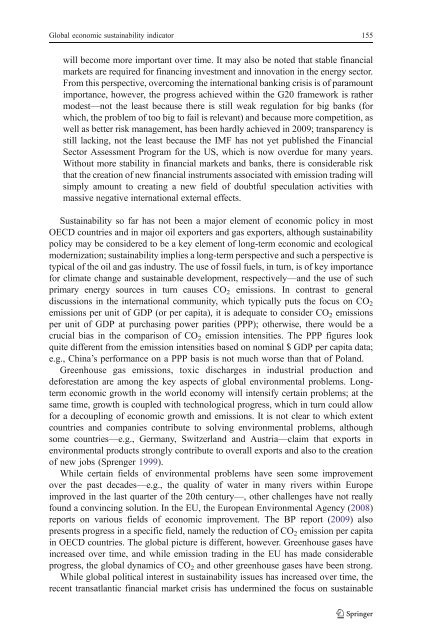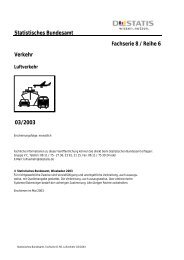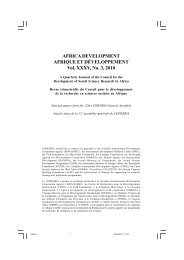The international economics of resources and resource ... - Index of
The international economics of resources and resource ... - Index of
The international economics of resources and resource ... - Index of
Create successful ePaper yourself
Turn your PDF publications into a flip-book with our unique Google optimized e-Paper software.
Global economic sustainability indicator 155<br />
will become more important over time. It may also be noted that stable financial<br />
markets are required for financing investment <strong>and</strong> innovation in the energy sector.<br />
From this perspective, overcoming the <strong>international</strong> banking crisis is <strong>of</strong> paramount<br />
importance, however, the progress achieved within the G20 framework is rather<br />
modest—not the least because there is still weak regulation for big banks (for<br />
which, the problem <strong>of</strong> too big to fail is relevant) <strong>and</strong> because more competition, as<br />
well as better risk management, has been hardly achieved in 2009; transparency is<br />
still lacking, not the least because the IMF has not yet published the Financial<br />
Sector Assessment Program for the US, which is now overdue for many years.<br />
Without more stability in financial markets <strong>and</strong> banks, there is considerable risk<br />
that the creation <strong>of</strong> new financial instruments associated with emission trading will<br />
simply amount to creating a new field <strong>of</strong> doubtful speculation activities with<br />
massive negative <strong>international</strong> external effects.<br />
Sustainability so far has not been a major element <strong>of</strong> economic policy in most<br />
OECD countries <strong>and</strong> in major oil exporters <strong>and</strong> gas exporters, although sustainability<br />
policy may be considered to be a key element <strong>of</strong> long-term economic <strong>and</strong> ecological<br />
modernization; sustainability implies a long-term perspective <strong>and</strong> such a perspective is<br />
typical <strong>of</strong> the oil <strong>and</strong> gas industry. <strong>The</strong> use <strong>of</strong> fossil fuels, in turn, is <strong>of</strong> key importance<br />
for climate change <strong>and</strong> sustainable development, respectively—<strong>and</strong> the use <strong>of</strong> such<br />
primary energy sources in turn causes CO2 emissions. In contrast to general<br />
discussions in the <strong>international</strong> community, which typically puts the focus on CO2<br />
emissions per unit <strong>of</strong> GDP (or per capita), it is adequate to consider CO2 emissions<br />
per unit <strong>of</strong> GDP at purchasing power parities (PPP); otherwise, there would be a<br />
crucial bias in the comparison <strong>of</strong> CO 2 emission intensities. <strong>The</strong> PPP figures look<br />
quite different from the emission intensities based on nominal $ GDP per capita data;<br />
e.g., China’s performance on a PPP basis is not much worse than that <strong>of</strong> Pol<strong>and</strong>.<br />
Greenhouse gas emissions, toxic discharges in industrial production <strong>and</strong><br />
deforestation are among the key aspects <strong>of</strong> global environmental problems. Longterm<br />
economic growth in the world economy will intensify certain problems; at the<br />
same time, growth is coupled with technological progress, which in turn could allow<br />
for a decoupling <strong>of</strong> economic growth <strong>and</strong> emissions. It is not clear to which extent<br />
countries <strong>and</strong> companies contribute to solving environmental problems, although<br />
some countries—e.g., Germany, Switzerl<strong>and</strong> <strong>and</strong> Austria—claim that exports in<br />
environmental products strongly contribute to overall exports <strong>and</strong> also to the creation<br />
<strong>of</strong> new jobs (Sprenger 1999).<br />
While certain fields <strong>of</strong> environmental problems have seen some improvement<br />
over the past decades—e.g., the quality <strong>of</strong> water in many rivers within Europe<br />
improved in the last quarter <strong>of</strong> the 20th century—, other challenges have not really<br />
found a convincing solution. In the EU, the European Environmental Agency (2008)<br />
reports on various fields <strong>of</strong> economic improvement. <strong>The</strong> BP report (2009) also<br />
presents progress in a specific field, namely the reduction <strong>of</strong> CO 2 emission per capita<br />
in OECD countries. <strong>The</strong> global picture is different, however. Greenhouse gases have<br />
increased over time, <strong>and</strong> while emission trading in the EU has made considerable<br />
progress, the global dynamics <strong>of</strong> CO2 <strong>and</strong> other greenhouse gases have been strong.<br />
While global political interest in sustainability issues has increased over time, the<br />
recent transatlantic financial market crisis has undermined the focus on sustainable








